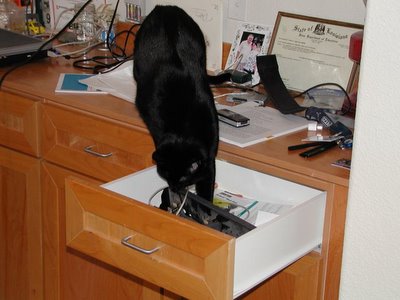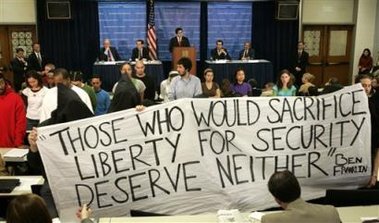We're the United States of America, the wealthiest, most powerful nation on the planet. So why, oh why, are school children in Louisiana going to school in tents?!
Since the above link will disappear shortly (NOLA.com disappears them behind a for-pay wall after a time), I will excerpt parts of it:
St. Bernard Unified School, operating in tents, trailers and the second floor of the flooded Chalmette High School, allowed the family to reunite and return from exile. For Larry and Elizabeth, as for most of the 640 students, the school -- a single campus for preschool through high school -- has become an oasis of calm in their shattered lives. Neither they nor their parents had expected St. Bernard Parish, where almost no home or business escaped floodwaters, would have a school for months, if not years.
FEMA and our can't-do federal government was a whole lot of help:
After more than a month of frustrating and fruitless negotiations with the Federal Emergency Management Agency, which has yet to deliver the first dollar of aid to the school system, Voitier and her minuscule staff designed and opened the school in just three weeks. FEMA officials could not be reached for comment Friday evening.
Even as Voitier and her staff have filled the campus with students, little has changed in the way of federal aid. To date, FEMA hasn't contributed one dime or one hour of labor to the project beyond endless administrative meetings, Voitier and her staffers said.
"I find it almost comical that we've started a school here while the federal government, with all its resources, still can't get a post office running," said Lyall Barwick, an information technology administrator and baseball coach whom Voitier pressed into service to coordinate cleanup and construction of the campus.
But to even get a tent school going, they had to break the law and spend money they didn't have:
Along the way, Voitier bent or ignored many of the federal guidelines requiring layers upon layers of design and procurement procedures, which would have pushed the opening of school back for months. She said she broke more rules in three weeks than she's broken in her life.
"I'm going to jail," she said, with a sharp, nervous laugh. On Nov. 14, St. Bernard Parish opened a public school in a community suffering some of the worst damage in American history two weeks before New Orleans officials opened their first public school in the dry environs of Uptown.
Yes, there's that famous "Louisiana corruption" in action. I've dealt with Louisiana governments all over Louisiana as a computer consultant. By far the majority of the local government officials I've dealt with are dedicated public servants who are trying to do what they can with inadequate resources, cutting corners and bending rules as necessary in order to serve their communities. The Federal Government regularly comes in and whangs them for not dotting all the 'i's and crossing all the 't's, but when you have a school district whose entire central office staff consists of four people, it's just plain impossible. So these people put their own careers and possibly even their on freedom on the line in order to do what it takes to provide necessary services to the people of their community.
But the payback?
Students poured in that morning, many arriving from temporary homes more than an hour away, hugging and screaming at the sight of one another.
"This is the first time since the storm I've had a reason to smile," one father told Warner that morning.
Another student, at lunch that first day in the white tent now serving as a cafeteria, seemed thrilled at the prospect of a school lunch.
"Oh look! Real food!" he exclaimed when he got his plate.
Note that at this time of year, even in St. Bernard Parish (amongst the most southerly places in the state) the morning temperatures are in the upper 30's/lower 40's. A tent is not the most comfortable place to be in those kinds of temperatures. But a tent is what they have, and probably will have for some time, because the school district is bankrupt:
Sitting in that same tent three weeks later, Voitier beamed with pride over the happy children that now filled the school's campus, but wondered aloud how she would pay for it all.
Under the best-case scenario, FEMA will reimburse 90 percent of most of her emergency spending, but Voitier concedes she can't even come up with the remaining 10 percent.
"We're in a severe -- I mean severe -- cash-flow crisis," she said. "I've fronted all the money I can. Contractors aren't getting paid, and FEMA hasn't paid us."
So the tent is "it", for the foreseeable future. There is no money to do anything else. But for the majority of the students, that is no different from what they're living in at "home" -- the back seats of cars, tents, old trailers salvaged from the floodwaters, whatever shelter they can find in a parish where virtually all homes were destroyed, in a scene reminiscent of 3rd world countries such as Nicaragua where people live in the destroyed rubble of their homes for years after they were destroyed by an earthquake:
As Larry Rush, 15, ate a hot Sunday meal at the FEMA tent city on the site of the old Kaiser Aluminum plant the week before school let out for Christmas, he pondered the meaning of it all.
"Everybody keeps telling me it's a lesson," he said. "Well, I'm tired of the lesson."
Outside, his mother made another exasperating call to FEMA, asking about the promised trailer they had said would arrive a month ago. She hung up with no satisfaction, struggling to hold back tears.
The next morning before school, Larry looked over two one-page essays he had been assigned for homework. For one titled, "Something I Worry About," he'd written:
I really don't know where I'll be on the next day and the next, because my family and I have been going from place to place to stay or sleep at night. . . . I been a little worried about school, because what I don't know is how I'm going to be able to keep up my work and everything else.
Larry was assigned another essay titled, "Something I'm Happy About."
He managed only one sentence.
I'm happiest when I'm with friends and family, when everything is forgotten about what happened with the storm.
"How do you write that you're happy when you're living in the cold in a truck?" his sister said.
This is America? Really? This is America?
- Badtux the not-snarky-at-the-moment Penguin











